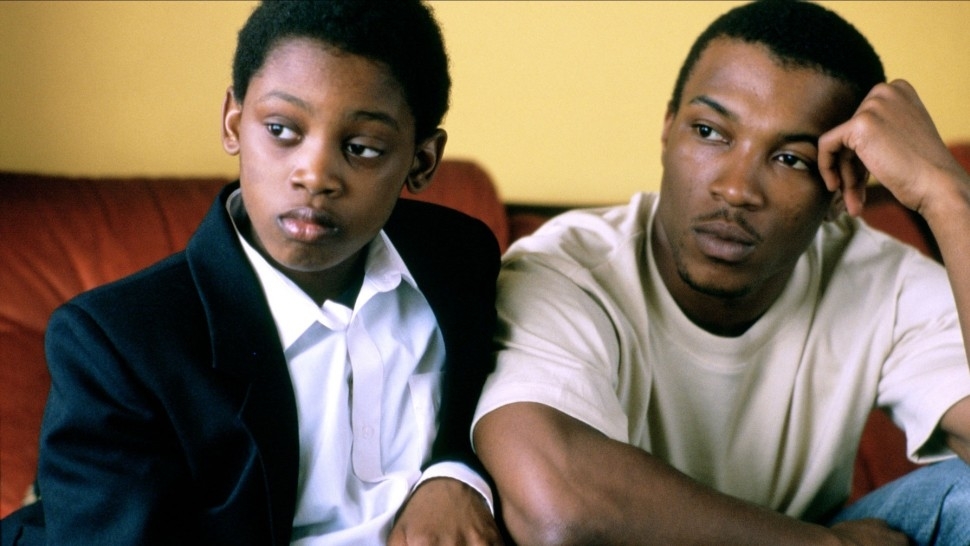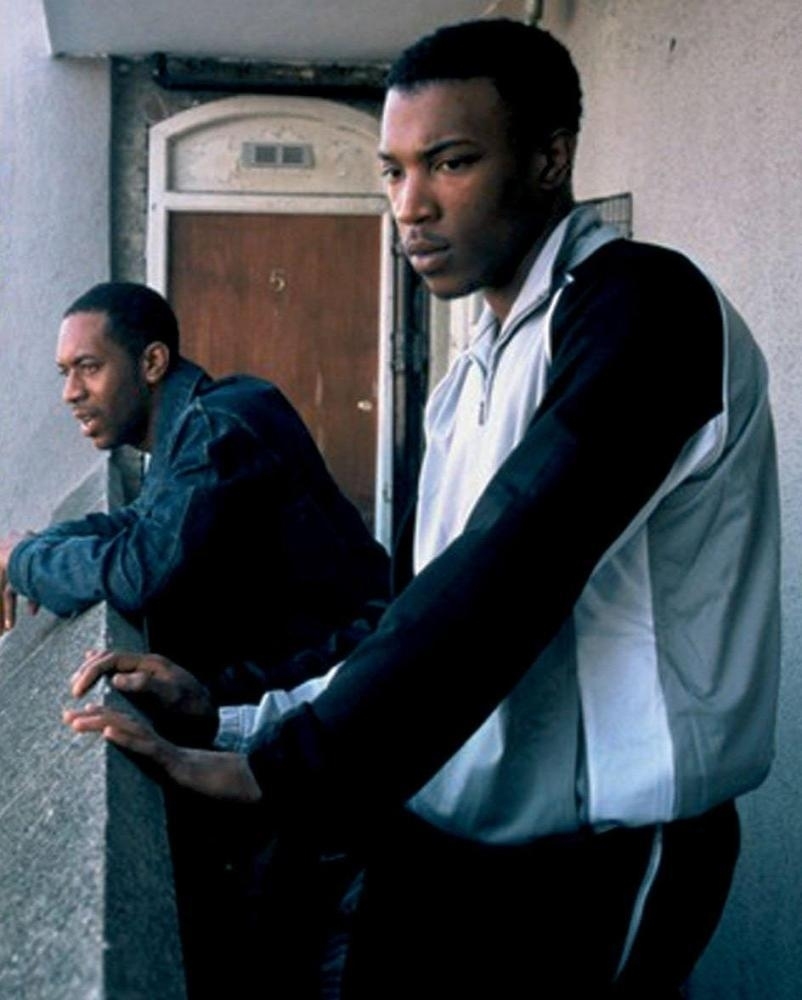
Twenty years ago, London-born documentarian Saul Dibb recruited rapper-turned-actor Ashley Walters for the story of Bullet Boy.
In the film, we follow Ricky, a young man who returns home from prison, determined to leave his criminal past behind. However, the pressure of his environment makes this goal increasingly difficult and his old life begins to catch up with him. Set in Hackney, Bullet Boy is a sombre and honest coming-of-age tale that explores the harsh realities faced by Ricky in the film’s unflinching portrayal of the cyclical nature of violence, and the impact it has on communities. Not only focusing on Ricky, Bullet Boy also highlights how his younger brother, Curtis, is susceptible to being caught up in the same perilous circumstances.
Shot on a wide-angle lens, Bullet Boy immerses the audience in Ricky’s environment instead of hiding viewers from his inescapable choices. The cinematography is raw, warm and familiar, allowing people to better understand Ricky’s life instead of being cold or alienating. Scored by Robert Del Naja of Massive Attack, who conveys the depth and heartache perfectly through emotive lyrics and atmospheric beats, Bullet Boy’s strength lies in its authenticity, capturing the spirit of the East End with a documentary-like realism, which has also been explored by directors such as Andrea Arnold, Ken Loach and Mike Leigh, who use their films as vehicles to shine a light on underrepresented groups in British society.
Nominated for several awards, Bullet Boy’s Ashley Walters won Most Promising Newcomer at BIFA and director Saul Dibbs won three out of five nominations for his debut feature film. As well as being hailed critically, Bullet Boy was also included in the national education curriculum, across PSHE, Religious Studies and Citizenship lessons. Not only was Bullet Boy a critically-acclaimed, award-winning film, it also inspired a whole new genre—UK Hood Cinema—which birthed other iconic films such as Kildulthood and Shank, and TV shows like Top Boy.
Through his contributions to music via the disruptive UKG collective So Solid Crew and on-screen roles through the character of Dushane Hill from Top Boy and Ronnie Pike Jr in Bulletproof (a Sky One show co-created by Walters himself), and many more roles for almost three decades, Ashley Walters has built a legacy which has significantly influenced Black British culture, inspiring future generations of artists and actors through his work. To celebrate Bullet Boy’s greatness, we caught up with Ashley Walters to discuss his experiences on set, Saul Dibb’s directorial style, and its legacy twenty years on.
“Bullet Boy created a new style of movie. It also made it normal for us to see that sort of harsh reality on screen… Without Bullet Boy, there probably wouldn’t be TV shows like Top Boy.”
View this video on YouTube
COMPLEX: This year marks 20 years of Bullet Boy, a film that essentially kickstarted the UK Hood Cinema phenomenon. So, firstly, thank you for doing it and opening up so many doors. What was it about the Bullet Boy script that initially drew you to it?
Ashley Walters: When I was released from prison and had my first meeting with [the film’s director] Saul [Dibb], he gave me the script and said that he and Catherine Johnson, who had written the screenplay, always had me in mind for the role. What made me want to do the film were the similarities between me and the character—they were uncanny! I just came out of prison and the main character just came out of prison, too. I didn’t want to go back to the same life that I was living before so I needed to make a change, and Ricky did as well. That is essentially what drew me to Bullet Boy: I saw myself in it. I had a strong ambition to change my life around, to reform my immediate circle which I thought was bad for me, in order to make a change in my life. So did Ricky because he had a friend that he had unwavering loyalty to, which essentially got him killed at the end. We come from the same world, and being a Black boy growing up in an inner-city area and under a system that is built to suppress you rather than to uplift you was very relatable.
When the film came out, it became a fixture in the national curriculum throughout secondary schools, which was a big indication of it transcending cinema and also becoming a really useful tool being used in youth spaces and critical thinking. I remember being so proud of that because it gave me some indication of the life that Bullet Boy was going to have. I didn’t know that it would have this legacy and, to be honest, it has been suppressed for so many years and not readily available or overly pushed. But it would be nice for it to be one of those movies that reoccur every year somewhere, somehow.
Before you were in So Solid Crew—as a kid, you briefly starred in Grange Hill. Then, in 2000, you starred in the Brit-flick Storm Damage, before securing your first lead role as Ricky in 2004’s Bullet Boy. Did you find it difficult to find your footing in the acting world again after so many years in music?
I didn’t find it difficult, but maybe that’s because I didn’t see myself being an actor. Even when I was acting, it was just something that I did out of passion rather than seeing it as a viable career. I guess, in that respect, that’s why I didn’t find it difficult. I started to take acting more seriously around Bullet Boy and saw it as a career option. It was at that point politics became an issue and the difficult side of the industry came into it, including typecasting, being pigeonholed into specific roles, and not being allowed to explore my range as an actor. In order to change that, I had to refuse certain work so I could be considered for other roles because, at that time, every role was pretty much the same. Realistically, my main successes have been Bulletproof and Top Boy. A lot of my supporters come from those shows. But I was also on TV regularly back in the day on Grange Hill. I would also say that I was one of the few Black people on television during that time, and in the West End—this was way before music too. Storm Damage and Bullet Boy gave me boots-on-the-ground experience, though, for sure.
What are some of your favourite things about Bullet Boy?
The cinematic choices by Saul, the marriage of Saul’s background, which was predominantly documentary work up until that point, his experience and his skillset from filmmaking actually gave Bullet Boy a style that I don’t believe had been adopted before in the UK. What Saul did with this film was rip up the rulebook, making a camera act as a fly on the wall, letting people breathe and live in that space as much as possible. I think that created a new style of movie and also made it normal for us to see that sort of harsh reality on screen. That, in turn, made filmmakers braver to strip back all the bells and whistles, focusing more on drama and character, and trusting that a good, relatable story is enough to carry a film. For me, that was the best thing about the film; it shed a light on something that we were all so familiar with, but in such an authentic way that it felt like you were watching a documentary. There was a consistent use of improvisation and there were many actors that had never acted before.
All of that stuff and those similarities could be what has made Top Boy so big as well. I think, without Bullet Boy, there probably wouldn’t be TV shows like Top Boy. Bullet Boy was such a great experience and there were many amazing moments with the other actors and director, but it was such a long time ago—twenty years ago is hard to remember. And, sometimes, the key moments you tend to remember are the more difficult ones… I want to revisit the film in a positive way, so this is me being the least negative I can be about it, but for most of the film, I was wearing bulletproof armour underneath my clothing. That is how volatile it was to film in the area that we were filming in and around.
“Most of the roles you’ve seen me in over the last seven years, I created myself. I’m fortunate enough to have built up years of experience and knowledge to know that you have to be the change you want to see in this game, especially as a Black man.”

When Bullet Boy was being filmed, tensions between gangs in Hackney and neighbouring areas were really high; it was often referred to as “Murder Mile”, so it must have been a really tense time in general.
It was a tense period for most of the actors who were mainly non-actors and were from the area because they could understand those tensions. But for a predominantly white film crew, they didn’t understand the nuances of territorial gang stuff and all of that. It was tough, and a lot of the time it wasn’t the easiest shoot—I have to be honest about that. But it was a really important learning experience.
How do you think the themes or messages of Bullet Boy resonate with audiences today, and why do you think it’s considered such a cult classic?
That is a very important question and the answer is pretty simple: it’s because of all the difficult topics that we handle in the film, including fear, ambition, murder, and the ripple effects that it has on a community, especially a mother. Unfortunately, a lot of these things have continued to happen since that film, and young Black men dying for no reason is still happening today. But there are a lot of other things that have changed in the world and across the media. My kids will not watch Bullet Boy because the minute they see that the camera is a bit grainy, they will call it old and want it to look all glossy [laughs]. But people who do give it the time understand and it always resonates with them because they can relate to it or recognise the importance of the story being told.
How has your perspective on this film changed over time since its release?
My perspective has never changed because it was the key to me having a career. Before that point, I didn’t care about acting, or the craft. I didn’t care about having a career in film until literally standing at the podium after winning the award for Bullet Boy when it came out. It’s a film that changed my whole perspective on the game and it was like I was reborn there. Six months before that, I was a gun-toting gangster on the front of all the papers and all doors closed on me, so to be in that position then meant I could change if I tried hard enough and from there, I gave it everything.

Earlier you mentioned typecasting—is that something you still face in your career?
I’m fortunate enough to have built up many years of experience and knowledge to know that you have to be the change that you want to see in this game—especially as a Black man, because I can only talk from that perspective. Most of the roles you’ve seen me in over the last seven years, I created myself. Typecasting still exists and you can take the easy road; I think a lot of actors do and it’s no disrespect to them because this is such a tough game, but I have always been about pushing the boundaries and most of the things that I’ve done are dial movers. If you look at So Solid, it was at the start of a new wave of music in Black culture. If you look at Bullet Boy, it was a poignant change in film, and Top Boy did the same for TV. I have been privileged enough to be at the forefront of those moves and I want to continue in that vein.
So, what’s next for you? You’ve probably got a lot of exciting projects in the works.
I have got some really cool things that I’m working on which I won’t speak about yet, but those things will come soon. I’m currently shooting a couple of Netflix shows back to back, which is really exciting—but tough. This year, I’ll also be shooting my first feature film as a director! I don’t wanna give away the story because I want it to be a surprise, but I’ve been working on it for so long. We managed to get support from Sky, Film4 and the BFI, which is so amazing, and we are just crewing up at the moment. The script has been written by the great director-writer Nick Love, who I know and work with a lot; the aim is to bring his story to life and it’s really exciting to be in this position after directing TV for the last two, three years. Now, I feel like I’m ready, and I’ve got enough experience under my belt to handle my first feature.



